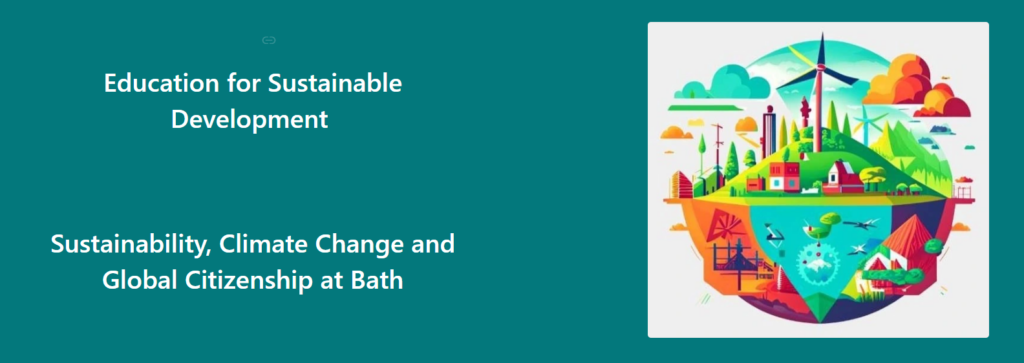Published on: 20/02/2024 · Last updated on: 14/10/2024
Education for Sustainability at Bath
Embedding citizenship and sustainability is a key curriculum principle at Bath. How we understand and approach ‘sustainability’ will radically shape how and where we see opportunities for these in the curriculum. The concept of sustainability extends far beyond environmental issues, being inextricably linked with social and economic factors and is therefore relevant to every discipline.

Staff at Bath have developed a set of Education for Sustainable Development @Bath guidance and resources to support colleagues with embedding sustainability, climate change, and global citizenship in their courses and units. These Sharepoint resources are part of a toolkit developed through a Teaching Development Fund project led by Nicki Schantz (Research Assistant) and Dr MariCarmen Gil Ortega (Director of Teaching, Department of Education).
Other useful links:
Climate change and the University of Bath
Institute for Sustainability (bath.ac.uk)
cast.ac.uk – The Centre for Climate and Social Transformations
Identifying opportunities
Below are some starting points for considering how and where sustainability might be embedded in your curriculum. These are useful for identifying opportunities to build on existing content and approaches.
Using the Sustainable Development Goals
The Sustainable Development Goals (SDGs) provide a globally recognised framework through which to identify common challenges and provide direction for active citizens to enact positive change in a sustainable way. Many universities across the world are using this framework to guide their activity. In 2019, a team of researchers at Bath investigated how the SDGs mapped onto existing provision and the findings are available to read and explore.
Find out more about using the SDGs here: Education ABOUT Sustainability (sharepoint.com)
Subject Benchmark Statements
QAA Subject Benchmark Statements set out expectations of standards for bachelors and masters level degrees in a range of disciplines. They are created by academics in the disciplines are reviewed and updated on a regular basis. Statements now include detail on where sustainability might be expected to be addressed within a particular discipline. Whilst they are not intended to be prescriptive, they do provide a useful starting point for reflecting on your current course and unit provision.
Developing competencies
Equipping students with relevant skills, values, and competencies, in conjunction with knowledge of real world issues, will enable them to successfully engage with sustainability problems and challenges. It is likely that your course will already be addressing many of these already – do your students recognise this?
Find out more about relevant competencies and how these relate to sustainability here: Education FOR Sustainability (sharepoint.com)
Examples from different disciplines
The Big Picture Challenge: Empowering students with design thinking
Vertically Integrated Projects: Innovative research and applied learning projects that enable inter-disciplinary, multi-level teams of students to work with a member of academic staff on long-term real-world projects, often focused on sustainability themes.
We are in the process of developing further case-studies that demonstrate different approaches to embedding sustainability in the curriculum at Bath.
Resources
Education for Sustainable Development @Bath – Home (sharepoint.com) – use the side menu to find a range of general and subject-related resources. The Sharepoint resources were created by Nicki Schantz (Research Assistant) and Dr MariCarmen Gil Ortega (Director of Teaching, Department of Education) as part of the Embedding the UN SDG and sustainability competencies into UG and PGT programmes TDF project.
World Climate Simulation – The World Climate Simulation game is a role-playing game premised on a fictitious international climate summit. A facilitator plays the role of a UN leader, while each participant plays the role of a delegate representing a specific nation, negotiating bloc, or, in some cases, an interest group.
Education for Sustainable Development (Advance HE) – a range of resources including literature reviews and examples of good practice.
Education for Sustainable Development (QAA/Advance HE) – This guidance is primarily aimed at staff involved in curriculum design and course management and delivery, to support them in designing ESD into their courses. However, it is also likely to be of value to senior management teams, those with responsibility for quality assurance and enhancement, and staff involved in directing teaching and learning. It may also prove useful to staff responsible for extracurricular activities.
Angus-Cole KL, Eaton R and Dawes M. The design and delivery of a workshop to support curriculum development, education for sustainability and students as partners: Sustainability in your curriculum – identify, improve, inspire! Emerald Open Res 2020, 2:60 (https://doi.org/10.35241/emeraldopenres.13878.1)